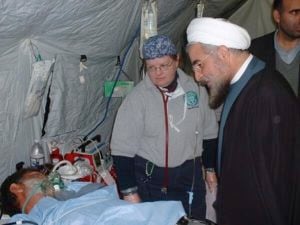Article VI of the Islamic Republic of Iran’s constitution “mandates popular elections for president and parliament.” Four years after the controversial presidential election that kept Mahmoud Ahmadinejad in power, the Iranian people have elected a new leader. On June 13, Hassan Rouhani won more than 50 percent of 36.7 million votes cast and became Iran’s president elect. Rouhani will assume office on August 3 amidst an international media frenzy and speculation about the future of Iran’s policies and relationships with the West.
For eight years Mahmoud Ahmadinejad represented the Iranian people. Under his presidency, the Iranian people have endured human rights violations and political repression. The international community’s relationship with Iran floundered, flat lining at times, and now the world waits in anticipation to see if Iran’s new president will be the force for change needed to reconcile international disputes and provide safety and comfort to the Iranian people. According to the media’s interpretation of the president-elect’s proposed policies and beliefs, there is reason to be hopeful.
Rouhani, a 64-year-old cleric, has publicly denounced Internet censorship and government intervention in peoples’ private affairs. Further separating himself from the socially iron-handed Ahmadinejad, Rouhani criticizes gender segregation and the morality police harassing people because of their dress. While his views may be cause for the West to heave a sigh of relief, it is uncertain whether Rouhani’s sweet sentiments will result in a tempering of state policies by the Islamic Republic. Overall, optimistic reports of Rouhani’s moderation have flooded international media outlets.
Days after his victory, Rouhani tweeted a photo of himself visiting an American field hospital that was set up in Iran to treat victims of a 2003 earthquake.

@HassanRouhani: Flash from the past: #Rouhani visits #US field hospital set up to treat survivors of 2003 earthquake in Bam pic.twitter.com/rgKNDN9r1V
While the soon-to-be leader’s interest in social media platforms currently banned in the Islamic Republic may symbolize his acceptance of the outlets as beneficial political tools, these perceptions have yet to yield commitments to if and how social policies in Iran may change.
Rivaling interest in the president-elect’s political ideas is his character, which the media has wasted little time to praise, question, and condemn. Farideh Farhi, an Iranian specialist at the University of Hawaii, validates Rouhani’s intelligence based on the multilingual cleric’s educational background.
She said:
He was admitted to the toughest university in Tehran before the revolution – that’s when the law school had not turned religious. The same law school produced Nobel Peace laureate Shirin Ebadi. So one cannot doubt, given the competitiveness of that process, that he’s actually a rather smart guy.
While some news outlets applaud Rouhani’s academic achievements, others question his integrity. The president-elect was recently accused of plagiarizing part of his PhD thesis. The Scottish Caledonian University, from where Rouhani received his doctorate, is reserving comment until after the full text (500 pages) of the thesis is reviewed. One paragraph, with similarities to a section from a book written by Mohamed Hashim Kamali, is under fire. The Islamic legal scholar’s book, Principles of Islamic Jurisprudence, was first published in 1991. Rouhani’s thesis was submitted in 1998.
The following are excerpts from two pages of Kamali’s Principles of Islamic Jurisprudence:
(1) This style of Qur’anic legislation, and the fact that it leaves room for flexibility in the evaluation of its injunctions, is once again in harmony with the timeless validity of its laws. The Qur’an is not specific on the precise value of its injunctions, and it leaves open the possibility that a command in the Qur’an may sometimes imply an obligation, a recommendation or a mere permissibility.
(2) As a characteristic feature of Qur’anic legislation, it may be stated here that commands and prohibitions in the Qur’an are expressed in a variety of forms which are often open to interpretation and ijtihad.
The following is an excerpt from Rouhani’s thesis, “The Flexibility of Shariah (Islamic Law) with reference to the Iranian experience”:
The primary source of the Islamic law (the Quran) is, in itself, flexible on the basis of the analysis that the Quranic legislation leaves room for flexibility in the evaluation of its injunctions. The Quran is not specific on the precise value of its injunctions, and it leaves open the possibility that a command in the Quran may sometimes imply an obligation, a recommendation or a mere permissibility. Commands and prohibitions in the Quran are expressed in a variety of forms which are often open to interpretation.
Despite investigation into Rouhani’s academic integrity, the media has, for the most part, avoided attacking the character of Iran’s soon-to-be-president. Instead, journalists have focused on if and how the next president will temper Iran’s policies and assuage the country’s tense relationship with the United States. During his first post-victory press conference, Rouhani alluded to the need for both countries to act with the best interest of their individual and collective futures. However, his idealistic sentiments of “healing old wounds” was underscored by Iran’s unwavering policy of not engaging in direct negotiations with the United States while the U.S. continued to enforce sanctions on Iran. Even with the non-negotiable condition for direct negotiations, journalists overwhelmingly characterize Rouhani as a force for change.
The president-elect undoubtedly inherits tremendous economic, social, and political issues, and like all those in the public eye, he will not be immune to criticism. While his opponents may take the opportunity to undermine his credibility, the international community should hope that the media will not shift gears from undertones of hope to amplifications of tensions.